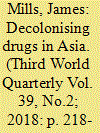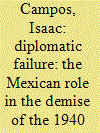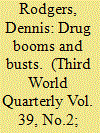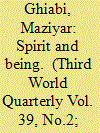|
|
|
Sort Order |
|
|
|
Items / Page
|
|
|
|
|
|
|
| Srl | Item |
| 1 |
ID:
157719


|
|
|
|
|
| Summary/Abstract |
This article examines a drugs trade in Asia that has been largely forgotten by historians and policy-makers, that in cocaine. It will briefly trace some of the contours of this commerce and the efforts to control it. It will also assess how successful these efforts were. The article is designed to contribute fresh perspectives on recent controversies in the historiography of drugs in Asia to argue that the agendas and agency of consumers are central to understanding why markets have formed there for psychoactive substances in the modern period.
|
|
|
|
|
|
|
|
|
|
|
|
|
|
|
|
| 2 |
ID:
157720


|
|
|
|
|
| Summary/Abstract |
In 1940 Mexico implemented a new revolutionary strategy in its fight against drug trafficking and addiction with a policy that legalized the sale of morphine to opiate addicts. While this approach to drug addiction was not entirely new or unique, it was strongly opposed by the United States, which responded by declaring an embargo on narcotic shipments to Mexico. As a result, Mexico was forced to abandon the plan just a few months after it was implemented. Often seen as a moment when Mexico might have gone in a different, less prohibitionist drug-policy direction, this episode has been overwhelmingly interpreted as an early and striking example of U.S. drug-control imperialism in Latin America. While such interpretations are not incorrect, they have missed an equally critical element of the story—a series of catastrophic diplomatic failures on the Mexican side which undermined various opportunities Mexico had to salvage the policy in some form. The episode thus stands in contrast to more well-known diplomatic challenges during the period in which Mexico’s diplomats have been lauded for outmaneuvering their U.S. and European counterparts.
|
|
|
|
|
|
|
|
|
|
|
|
|
|
|
|
| 3 |
ID:
157722


|
|
|
|
|
| Summary/Abstract |
The income generated by the drug economy can often be substantial for the different parties involved, even at the lowest rung of this illicit trade. Yet the drugs trade is also a notoriously volatile activity, meaning that drug-related prosperity is highly prone to boom-and-bust cycles. Drawing on ongoing longitudinal ethnographic research in urban Nicaragua, this article explores the consequences of the cyclical nature of the drugs trade, tracing its unequal patterns of capital accumulation, as well as what happened to those who benefited from the drug economy when it became more exclusive and then subsequently moved on elsewhere.
|
|
|
|
|
|
|
|
|
|
|
|
|
|
|
|
| 4 |
ID:
157721


|
|
|
|
|
| Summary/Abstract |
Much has been written and published about the 25 January 2011 Egyptian revolution from the perspective of contemporary history and political science. Much less attention has focused on social policy. I am unaware of any scholarly material that has dealt with illicit drugs during the critical 2011–2016 period, yet increasing drugs consumption provided a social backdrop to the events of that period. This paper identifies historical trends in illicit drugs consumption over the course of the last century to the beginning of the Arab Spring. During much of this period hashish was the drug of choice. This paper argues that drug consumption was on the rise in Egypt well before the downfall of President Husni Mubarak in February 2011, but that it has grown markedly since the ousting of the former president. It will ask which have been and are the drugs of choice in contemporary Egypt. It will further ask how this composition has changed and why, giving special focus to the relatively new mass, opioid drug, Tramadol.
|
|
|
|
|
|
|
|
|
|
|
|
|
|
|
|
| 5 |
ID:
157718


|
|
|
|
|
| Summary/Abstract |
Few commodities are as global as drugs. Cannabis, opium, heroin, amphetamines, lysergic acid diethylamide (LSD), khat, psychedelic cacti and mushrooms as well as an interminable list of other natural or synthesised substances travel and are consumed around the globe for all possible reasons. Human migration, trade, cultural trends, medical practice, political repression: together they constitute the drug phenomenon today – and indeed in much of human history. In this, drugs are spirit-like commodities, their value resting upon a fundamental ambiguity made up of individual, psychological, social, cultural, economic and medical circumstances. Defining a drug is an attempt at defining a spirit on the edge, which metamorphoses in time and space. At the same time, drugs remain a fundamentally political object. They are substances controlled by states, through mechanisms of policing, legitimated by judicial and medical evaluation, condemned often on moral grounds. Situated between a fluid social existence and a static legal dimension, drugs can become inspiring hermeneutic objects of study.
|
|
|
|
|
|
|
|
|
|
|
|
|
|
|
|
|
|
|
|
|